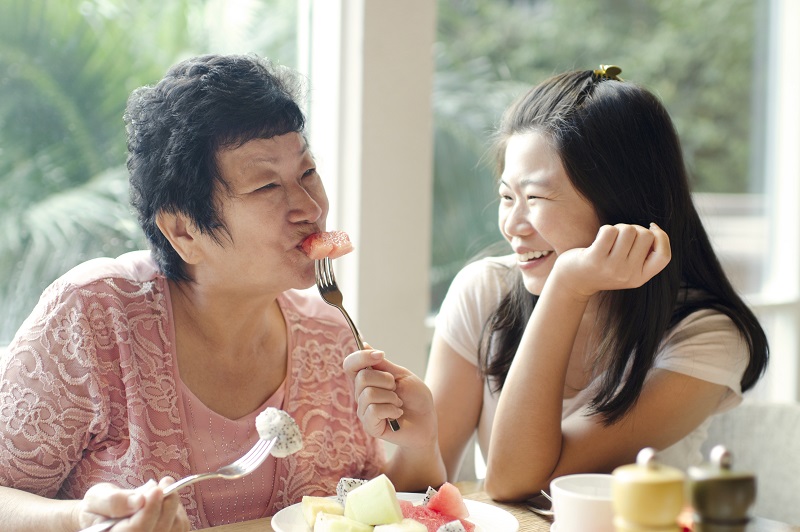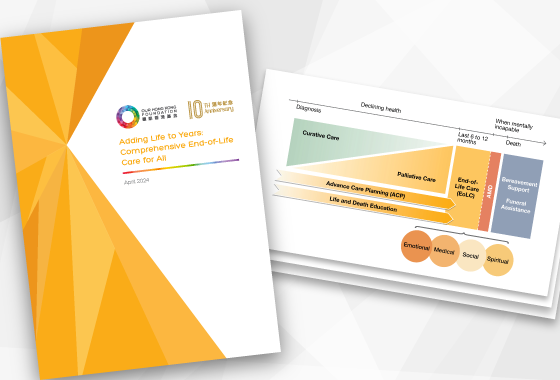Work-from-home carers need govt support amid pandemic
This article appeared originally in the CHINADAILY on 13 April, 2022.
Authors: Dr. Pamela Tin, Assistant Research Director and Head of Health Care and Social Development, Dicky Chow, Assistant Researcher, and Li Sze Wang, Research Intern at Our Hong Kong Foundation

Amid the turmoil of the latest omicron outbreak, the Hong Kong Special Administrative Region government has opened additional community isolation centers to provide caregiving for the COVID-19-positive elderly with mild conditions. Simultaneously, arrangements were announced for limited operations for subsidized welfare services, including daycare centers and home-based care.
Although additional formal caregiving for the infected elderly have been provided, formal caregiving services for the uninfected elderly have dwindled. Elderly dependents normally cared for by daycare centers are now forcibly relocated back home, with their families remaining the likely and only source of care for their loved ones.
Government figures in 2015 showed there were at least 203,700 informal carers residing with the disabled, and 175,600 informal carers residing with patients with chronic diseases. Coupled by the recent cutback of center-based services, with 1 in 4 people taking up additional caregiving responsibilities, it is expected the number of carers will increase dramatically during the pandemic. Informal carers who are full-time employed inevitably bear dual burdens as both carer and employee during extended work-from-home arrangements. Notably, no additional subsidies or programs have been announced for informal carers in the sixth round of the anti-epidemic fund, as informal carers remain as a stakeholder that is invisible to the government’s strategies.
Considering work flexibility
Although work from home (WFH) arrangements have been encouraged and largely adopted by public and private sectors alike, WFH alone remains rigid and insufficient for working informal carers to provide appropriate care to their elderly dependents. According to a recent survey by the Carer EPS Platform surveying over 1,600 informal carers in Hong Kong, 42.6 percent of informal carers have spent over 40 hours per week caring for their dependents during the fifth wave of the pandemic. The time spent on caregiving responsibilities far exceeded the expected hours of a full-time employee. Reducing workplace burdens through flexible working arrangements, including part-time work, job sharing, and compressed workweek arrangements, can potentially cater to the stressful schedules of WFH carers during these trying times.
In contrast, Singapore has further expanded its support for informal carers in 2018 in identification of the growing trend of informal care. From workplace support, carer respite, and financial support to carer empowerment and training, Singapore has expanded and consolidated the range of care options to provide accessible and integrated long-term care for its similarly aging population.
In addition to encouraging companies to adopt family-friendly employment practices, Singapore has further provided a work-life grant to incentivize companies to support flexible work arrangements. With more than S$140 million ($102.6 million) funding the work-life grant, 8,000 companies were incentivized to support over 90,000 employees to provide flexible load and time arrangements. With many working carers adopting WFH arrangements, adjusting working schedules through compressed or creative scheduling can accommodate carer needs that do not fit into traditional work schedules. Similarly, for working carers who bear extended hours with caregiving responsibilities, flexible shifts specifying days or hours in which they are available to work further caters to their caregiving responsibilities. Providing flexible work arrangements to working informal carers are critical in balancing both work and caregiving responsibilities particularly during the pandemic, and is perhaps an item Hong Kong should add to its COVID-19 response agenda.
As Hong Kong continues to battle its fifth COVID-19 wave, the extra burden placed upon informal carers will remain. Among the many population groups identified to require support, it is important we do not neglect the needs of ordinary citizens stepping in as informal carers. We must ensure that care is provided to these carers, within and beyond the unprecedented omicron crisis in Hong Kong.



